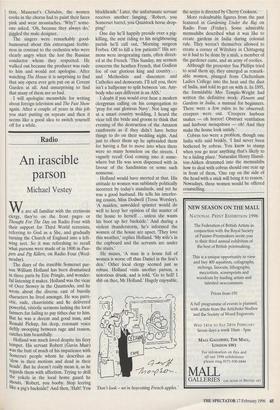Radio
An irascible parson
Michael Vestey
are all familiar with the cretinous clergy, they're on the front pages or Thought For The Day on Radio Four with their support for Third World terrorists, referring to God as a She, and gradually turning the Church of England into a left- wing sect. So it was refreshing to recall what parsons were made of in 1800 in Pau- pers and Pig Killers, on Radio Four (Wed- nesday).
The diary of the irascible Somerset par- son William Holland has been dramatised in three parts by Eric Pringle, and wonder- ful listening it makes. Holland was the vicar of Over Stowey in the Quantocks, and he wrote about the diverse cast of bucolic Characters he lived amongst. He was patri- otic, rude, chauvinistic and he delivered Powerful, vitriolic sermons lashing the local farmers for failing to pay tithes due to him. But he was a decent and good man, and Ronald Pickup, his deep, resonant voice deftly swooping between rage and reason, catches him beautifully.
Holland was much loved despite his fiery temper. His servant Robert (Gavin Muir) was the butt of much of his impatience with Somerset people whom he describes as Slow in their motions and dead in their heads'. But he doesn't really mean it, as he regards them with affection. Trying to drill the yokels in the local home guard he Shouts, 'Robert, you booby. Stop leering like a pig's backside!' And then, 'Halt! You blockheads.' Later, the unfortunate servant receives another fanging, 'Robert, you Somerset barrel, you Quantock horse drop- ping!'
One day he'll happily preside over a pig- killing, the next riding to his neighbouring parish he'll call out, 'Morning surgeon Forbes. Off to kill a few patients?' His ser- mons were invigorating rants, often direct- ed at the French. 'This Sunday, my sermon concerns the heathen French, that Godless foe of our glorious king and country... and Methodists and dissenters and Catholics and democrats. I'll tell you, there isn't a halfpenny to split between 'em. Any- body who says different is an ASS.'
I doubt if you would ever hear a modern clergyman calling on his congregation to 'pray for our glorious Navy'. Not long ago at a smart country wedding, I heard the vicar tell the bride and groom to think that evening of the destruction of the Amazon rainforests as if they didn't have better things to do on their wedding night. And just to cheer them up he upbraided them for having a flat to move into when there were so many homeless on the streets. I vaguely recall God coming into it some- where but He was soon dispensed with in favour of the Sandinistas or some such nonsense.
Holland would have snorted at that. His attitude to women was sublimely politically incorrect by today's standards, and yet he was a good husband. He tells his interfer- ing cousin, Miss Dodwell (Tessa Worsley), 'A maiden, unwedded spinster would do well to keep her opinion of the master of the house to herself .. . unless she wants his boot up her backside.' And during a violent thunderstorm, he's informed the women of the house are upset. 'They love this weather,' replies Holland. 'My wife's in the cupboard and the servants are under the stairs.'
He muses, 'A man in a house full of women is worse off than Daniel in the lion's den.' Other local clergy seemed just as robust. Holland visits another parson, a notorious drunk, and is told, `Go to hell! I shit on thee, Mr Holland.' Hugely enjoyable, 'Don't look - we're boycotting French apples. the series is directed by Cherry Cookson.
More redoubtable figures from the past featured in Gardening Under the Raj on Radio Four (Friday). Some admirable memsahibs described what it was like to create gardens in India during colonial rule. They weren't themselves allowed to create a corner of Wiltshire in Chittagong so it had to be done by a mali, a member of the gardener caste, and an army of coolies.
Although the presenter Sue Phillips tried to send them up, they emerged as remark- able women, plunged from Cheltenham Ladies College into the heat and the dust of India, and told to get on with it. In 1895, the formidable Mrs Temple-Wright had written the definitive work: Flowers and Gardens in India, a manual for beginners. There were a few rules to be observed: creepers were out. 'Creepers harbour snakes — oh horror! Obstruct ventilation and harbour mosquitoes — oh! And they make the house look untidy.'
Cobras too were a problem, though one India wife said briskly, 'I had never been bothered by cobras. You know to stamp when you go near anything that's likely to be a hiding place.' Naturalist Henry Hamil- ton-Aitken drummed into the memsahibs how to deal with cobras should one rear up in front of them, 'One rap on the side of the head with a stick will bring it to reason.' Nowadays, these women would be offered counselling.


























































 Previous page
Previous page